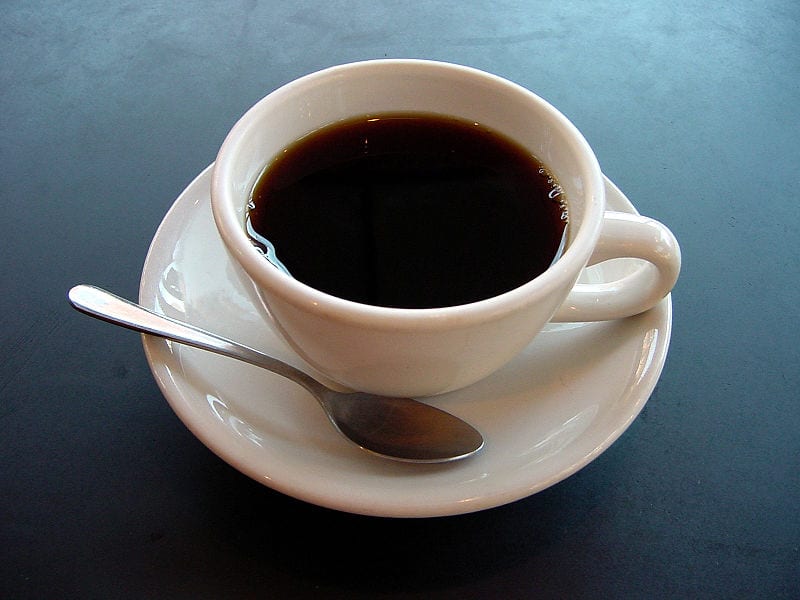Stumbling upon a slew of articles divulging the latest list of aphrodisiacal foods around Valentine’s Day is no big surprise. Lists range from foods containing ingredients that are thought to work within our bodies to induce a sexual reaction to foods that can simply arouse the five senses. All of the talk about aphrodisiacs that surfaces with a vengeance during this time of year illuminates a most obvious fact of life: human beings hunger to know more about anything and everything that might possibly feed their sexual fires. But what about those foods that do just the opposite? Although not scientifically proven, it won’t hurt to avoid at all costs the evil, sexual desire-killing twin of the aphrodisiac on Valentine’s Day: the anti-aphrodisiac.

(Media Credit/Julius Schorzman via Wikimedia Commons)
Caffeinated Beverages. According to Caring Medical & Rehabilitation Services, drinking too many caffeinated beverages, such as soda and coffee, can lower your sex drive by causing adrenal fatigue. If your adrenal gland does not produce enough hormones, you can suffer from both decreased desire for sex and inadequate energy to perform.
Cilantro. Asian monks eat cilantro in order to control their sex drives, claims Sam Greenspan of 11Points.com in “11 Foods That Just Might Kill Your Sex Drive.” But in the Middle Ages, people believed that cilantro held the power to boost the sex drive, and thus used it as a main ingredient in their love potions. So is cilantro an aphrodisiac or an anti-aphrodisiac? You decide.
 Corn Flakes. John Harvey Kellogg, the creator of Corn Flakes, believed that sex and masturbation were at the root of most health problems, Greenspan says. Kellogg whipped up the originally sugarless cereal under the impression that a bland breakfast could curb sexual urges throughout the day.
Corn Flakes. John Harvey Kellogg, the creator of Corn Flakes, believed that sex and masturbation were at the root of most health problems, Greenspan says. Kellogg whipped up the originally sugarless cereal under the impression that a bland breakfast could curb sexual urges throughout the day.
Gin & Tonic. While tonic’s main ingredient, quinine, has been associated with lowering testosterone levels, according to Dr. Matthew Karlovsky in his EmpowHER.com post “Can Certain Foods Kill Your Sex Drive?”, it is well known that alcohol of any variety has been linked to hindered sexual performance if consumed in excess. Gordon Attard of PimpThatFood.com suggests that because alcohol “inhibits inhibition itself,” perhaps this one should be counted as neutral.
Graham Crackers. Greenspan says that like Corn Flakes, Graham Crackers were the creation of a man who despised the uncontrollable sex drives of his contemporaries. Reverend Sylvester Graham, a Presbyterian minister in 1820s New Jersey, believed that a meat-rich diet lead to sexual promiscuity. In creating this bland cracker, Graham had hoped to suppress the sex drives of those around him.
Granola. James Caleb Jackson created the first batch of this crunchy cereal in the 1860s and called it “granula,” says Greenspan. Soon after, Kellogg stole the recipe and began selling it as his own. After being sued, Kellogg started to market his product as “granola.” (I think we know who came out on top in this battle). Like Kellogg’s Corn Flakes and Graham’s Graham Crackers, Jackson created this cereal in order to curb sex drives with the power of bland, tasteless food.
Energy Drinks. Like caffeinated beverages, energy drinks provide consumers with a forceful boost of energy followed by an even greater crash. David Zinczenko, editor-in-chief of “Men’s Health” and co-author of national bestseller “Eat This, Not That!” says in his article “Best and Worst Foods for Your Libido” that high sugar diets (and energy drinks contain a lot of sugar) can lead to temporarily lowered testosterone, and consequently a temporarily lowered sex drive.

(Media Credit/Tammy Green via Flickr)
Soy. According to Dr. Karlovsky, the phytoestrogens found in soy can disrupt the ratio of testosterone and estrogen, and testosterone is the driving force behind the libido for both sexes.
Mints. Although most look to mint-flavored candies and gum as secret weapons for freshening breath, eating too many mints could actually be bad for your libido, according to a study conducted by Suleyman Demirel University Medical School in Turkey, which found decreased levels of testosterone in rats that had consumed peppermint tea.
Fast Food. Just as plaque build-up from unhealthy fats, such as saturated and hydrogenated fats, found in fast food and fried food can lead to cardiovascular problems, it can also build up in the vessels of the penis, decreasing blood circulation and making getting an erection difficult despite how much you might want to get it on, according to Caring Medical & Rehabilitation Services.

(Media Credit/Heavybluesman via Wikimedia Commons)
Tomatoes. While tomatoes do indeed have their nutritional perks, Zinczenko suggests that the lycopene and phytofluene in these fruits can also decrease testosterone levels, and thus hinder one’s sex drive.
White Chocolate. While white chocolate isn’t exactly an anti-aphrodisiac per se, it’s interesting to note the difference between the aphrodisiacal quality of dark chocolate and the total lack thereof when it comes to white. According to Zinczenko, the heightened skin sensitivity and increase in serotonin that can result from eating dark chocolate doesn’t occur at all from consuming white chocolate. This is because white chocolate doesn’t actually contain any cocoa, the main ingredient in dark chocolate that produces those feel-good sensations.


Leave a Reply